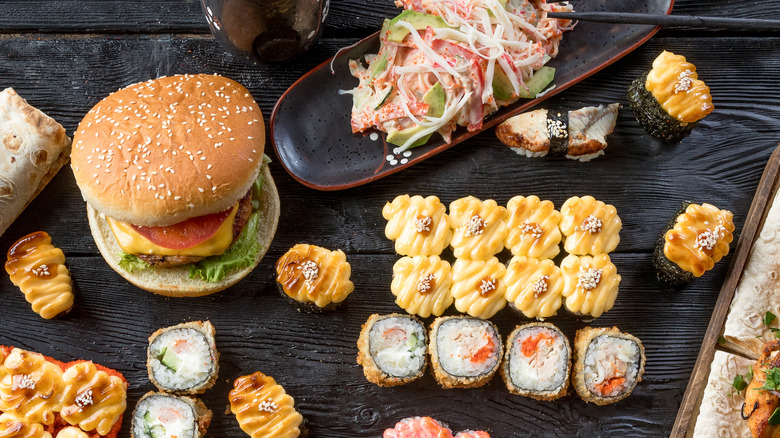Why Sushi And Burgers Shouldn't Be Served At The Same Restaurant
Some signs of a bad restaurant are too obvious to ignore. Dirty tables, off-putting smells, and inattentive waitstaff are all red flags. However, a strong smell could be harmless if its coming from region-specific ingredients like durian or Stinking Bishop cheese. Also, some cultures prefer hands-off waitstaff, so not easily being noticed could mean next to nothing as far as food quality. And while you should never eat at a restaurant that makes you feel unsafe or unwelcome, sometimes the best food comes from surprising places. Looking for life-changing barbecue? Skip the slick restaurants; you'll have better luck with a shack on the side of the road. But there's one telltale sign you definitely shouldn't ignore — sushi and burgers sharing a menu.
Why? Sushi and burgers require unique skill sets. Typically, good chefs pick a specialty and stick to it. The chances that a skilled sushi chef is also an outstanding grill-master are low, and both dishes are dangerous if they're improperly prepared. Raw fish can contain parasites that an inexperienced sushi chef might overlook. Likewise, the process of grinding meat exposes it to bacteria like E. coli, so poorly cooked burgers are a threat, too.
The pairing also signals a bloated menu. Some restaurants try to stay competitive with lots of options, but long menus often result in decision fatigue for customers and confusion for servers and cooks. It's a sign that the restaurant doesn't have much else to offer, and often means not-so-fresh food. Restaurants with limited menus need to order fresh ingredients on a regular basis, but if you're a burger from page four of a five-page menu, the beef may be past its prime.
Are burgers and sushi always a bad thing?
Remember, this isn't a hard and fast rule — just a good guideline. You might be eating at an exceptional Japanese-American fusion joint, where the chefs have taken time to learn each cuisine and understand how they relate. If that's the case, the menu should be streamlined and well thought out, focused specifically on the intersection of the two cuisines. Good fusion food is often experimental, so look for creative combos instead of crowd-pleasers. But a menu stocked with tacos, so-called "authentic" spaghetti bolognese, and overpriced truffle fries could be a scam.
Not sure? Politely probe your server for information on the ingredients. If they rattle off where and when the fish was caught, the cut of meat used for the ground beef, the farm it came from, and the name and favorite color of the cow, you know you're dealing with knowledgeable staff. If they look like a deer in the headlights, it might be time to go. Remember: it's okay to read the menu ahead of time. It'll save you — and the waitstaff — a lot of bother and potential disappointment.

